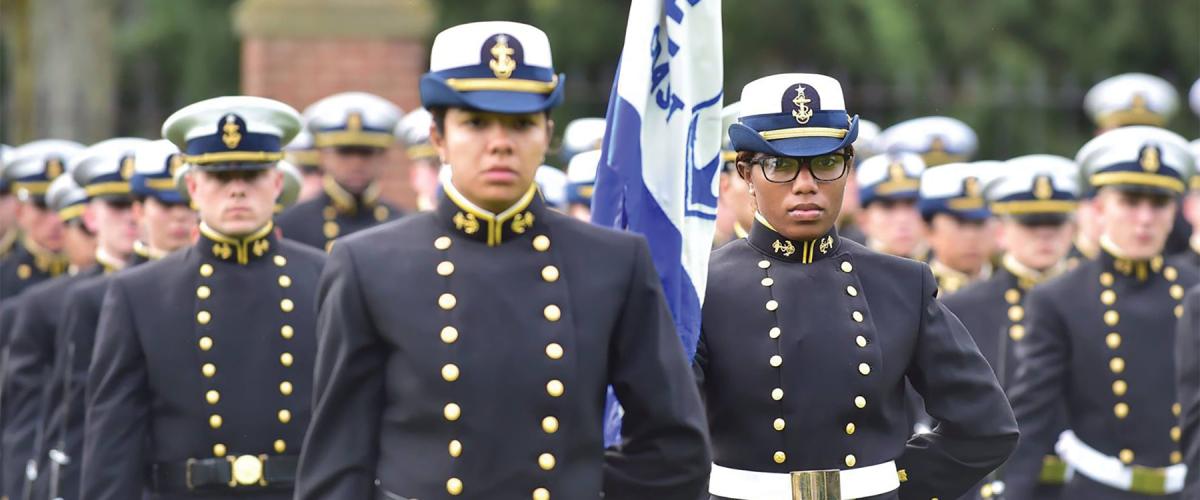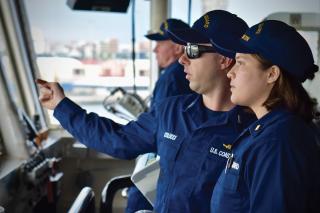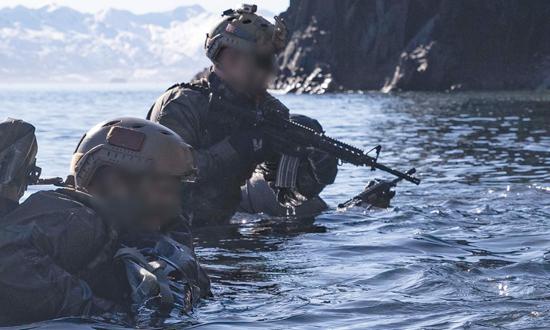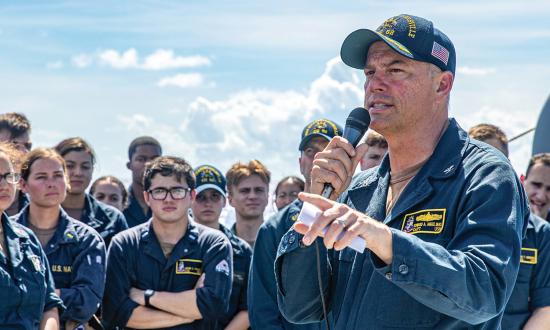Intrusive leadership, inclusive leadership, and servant leadership have been written and lectured about repeatedly in recent years, often leading to questions about how to combine these theories and apply them practically in today’s military. The tenets of these leadership theories have been spoken of so frequently that they have nearly become dogma to most leaders—both seasoned and aspiring. While these theories are highly relevant and needed in today’s Sea Services, it has become easy to hide behind them as proxies for effective, genuine leadership. Sea Service leaders need to ruthlessly and routinely self-assess to narrow the gap between actual versus perceived leadership performance to promote positive culture.1
Steadfast leadership and unfaltering character are paramount to ensure that positive cultures persist throughout the Sea Services. Cultivating sound leadership fundamentals is needed not only to underpin the defense of the nation, but also to ensure the U.S. military maintains a positive image in the eyes of the public, eager recruits, and current service members who embody their services’ core values.
To this end, we offer six leadership lessons—some observed, some practiced, and some learned the hard way—as a starting point to not only reduce undesirable leadership variability, but also to help stem the high rates of sexual assault and harassment in the ranks. Sincere leadership is critical to identifying solutions to these and other issues within the modern military, including an increased rate of suicide in the military and veteran communities and servicewide recruitment and retention challenges. From the most junior enlisted members to the most senior officers, everyone must be prepared to evolve their leadership frameworks to handle more complex personnel and operational challenges. These six leadership lessons start with the understanding that effective leadership is not “liker-ship” and then build key supporting concepts that combine authenticity and empathy. If widely adopted and practiced, these lessons could enhance self-awareness, improve critical thinking, and support growth to build productive relationships and face future challenges.
1. Leadership is Lonely
Leaders frequently attempt to gain favor from their subordinates by being overly friendly and relaxed about rules and regulations. Practicing this liker-ship blurs their focus on holding themselves and their subordinates to the highest standards of personal and professional accountability. It allows some leaders to rationalize looking the other way when they witness a policy violation or procedural infraction. This may make them seem likable, but it influences whether others respect them. We have seen countless cadets at the Coast Guard Academy attempt to be empathic leaders by lowering standards and looking the other way to avoid tough conversations. As company officers, we find that focusing on how one counsels an individual, delivers sanctions, and checks on their well-being after they are held accountable is what earns respect.
Making tough decisions that result in corrective or disciplinary action may be viewed as unpopular and cause subordinates to question whether you really care about them, but enforcing policies uniformly throughout the unit and upholding good order and discipline separates effective and respected leaders from phonies.
The Value: It is not about being liked or being the “cool” leader; it is about having the respect of your subordinates, peers, and superiors by consistently demonstrating integrity and ethics beyond reproach. Your crew may like you for your approachability, but when it comes time to make tough decisions, reliability and respect are what matter. They may not like your decision, but they will respect it, if they respect you.
2. Match Your Audio to Your Video
The contradictory order, often seen and interpreted as “Do as I say, not as I do,” is arguably the biggest gripe from subordinate personnel in the military. Far too often, leaders provide tasking and direction only to violate those orders later themselves. A recent example is the convictions of senior Navy officers involved in the Fat Leonard corruption case who most certainly stressed to their subordinates the need to lead ethically. Leaders have to not only talk the talk but also walk the walk. It is not enough to look the part of an ethically sound leader; one must live and breathe it both on and off duty.
As company officers, we have unfortunately seen this contradiction from both seasoned leaders and cadets. Often, it is a minor regulation infraction such as walking and texting. Occasionally it is something that brings into question core values adherence. Regardless, these actions erode the trust and credibility of leaders at all levels. We train cadets to pick the hard right over the easy wrong, and leaders must do the same.
The Value: Hypocrisy breaks trust within a command and at all organizational levels; the only way to always have your audio match your video, and vice versa, is a relentless combination of transparency and support for truth. Making mistakes is inevitable (we are all human), but the actions you take in the face of adversity are what make your reputation as a leader. The bottom line is that you must acknowledge and mitigate your shortcomings.
3. Create Conditions in Which People are Comfortable Speaking Up
Speaking up looks different in the military than in other workplaces in the United States. The concept of constructive dissent in the military is complex and not a one-size-fits-all model, especially when subordinates want to be heard. Taking the time to listen to others’ thoughts, incorporating their feedback and ideas when applicable, and thanking them for contributing supports an environment in which sharing ideas is common and not feared. Practice makes perfect. If you create a culture in which speaking up is commonplace for routine evolutions, then in tough situations or in a crucible leadership moment, your subordinates will speak up.
The Value: Most people do not speak up because they are afraid of getting shutdown or being wrong or ostracized, especially in front of peers. One instance of being shutdown by a leader may be all it takes to create an environment that instills fear for voicing alternative perspectives. Consistency is key in this regard; leaders must recognize that an environment in which others can safely voice opinions will help them avoid shoal water.
4. Know Everyone’s Name
During a recent cadet interview to serve as Coast Guard Academy Regimental Commander, an applicant shared a story regarding a senior leader “simply” remembering their name. In 2020, this cadet was attending a Coast Guard Women’s Leadership Initiative conference where they met now-retired Coast Guard Commandant Admiral Karl Schultz. Admiral Schultz introduced himself, asked the cadet for their name, made small talk, and then got pulled in another direction. Three months later, Admiral Schultz and this cadet crossed paths again, and Admiral Schultz remembered the cadet’s first name without hesitation. The cadet spoke about how impactful it was to have a senior leader remember their name, and how they instantly felt valued and seen.
On the contrary, there are experienced leaders who call subordinates cadet, midshipman, petty officer, or ensign, without any recognition of their name or rate. This can make service members feel unappreciated, similar to just being a number within the organization. Not remembering or caring enough to learn someone’s name shows you are not interested or fully invested in that service member.
The Value: In a world of distractions and competing demands, remembering subordinates’ names can have a positive psychological effect on their leadership and confidence. It shows you are invested in them and their contributions.
5. Be Humble, Ask for Help
Often, cadets and midshipmen report to service academies having been the valedictorian of their high school class or a three-sport varsity captain, always achieving excellence and never fully experiencing failure. However, whether it is failure in the classroom, barracks, or on the field, nearly all cadets and midshipmen will face failure, perhaps for the first time, while at their service academy.
The academies aspire to develop service-ready officers who are leaders of strong character. Part of that journey includes experiencing failure. When cadets and midshipmen fail, they are often embarrassed and refuse to seek mentors to guide them, letting their ego and pride take over. Aspiring leaders must be taught the fine line between self-confidence, a useful leadership quality inspirational to others, and the toxic characteristics of egoism and arrogance that drive away potential followers.2 Adopting a growth mindset that considers asking for help directly supports the quest for humility.
The Value: Aspiring and experienced leaders must recognize that failure is inevitable, and mistakes will be made, but what you do afterward is what defines your character. Seeking advice and admitting when you do not know how to solve a problem does not make you a bad leader—it makes you a smart one.
6. Be Present
The global pandemic showcased the Sea Services’ ability to adopt new technologies to successfully meet and conduct counseling and training virtually. There are positives, such as ease of collaboration, that arose from the use of Microsoft Teams and Zoom, but there also were issues that limited quality interactions with superiors, peers, and subordinates. Being virtually present is not the same as being physically present; and further, being physically present does not necessarily mean making the big speech in front of the crew, but rather being in the back of the room, visible to all and clearly engaged.3
This lesson became evident when working daily with cadets and midshipmen, as they see everything, and then talk about it, too. They constantly watch leaders—how you show up and how you speak and interact with everyone. They affirm the importance of leading by walking around, and that presence is the key to developing meaningful relationships. Including an element of unpredictability to your presence is imperative when enforcing regulations, emphasizing accountability, and showing a genuine interest in subordinate development.
The Value: Be present in mind, body, and spirit. Do not lose the crew by being physically present but not mentally, emotionally, or spiritually engaged; junior members are highly attuned to your presence.
Embrace The Journey
As aspiring and experienced leaders work to apply these lessons and develop their own, they should remember, there are no leadership experts. As retired Coast Guard Admiral Thad Allen put it so aptly in October 2022, “My own [leadership] journey has been characterized by the continual acquisition of knowledge and emotional maturation. I remain a work in progress!”4 Applying these lessons will require personal growth, and experienced leaders must routinely demonstrate them so all service members adopt them. This will support a focus shift from the tactical level to the organizational and strategic as they advance and promote into senior leadership roles and serve as catalysts for constructive change.
Today’s challenges demand that Sea Service leaders handle uncertainty and change. In the Coast Guard’s Commandant’s Intent 2022, Admiral Linda Fagan recognized, “Tomorrow looks different. So will we.” Her acknowledgment should not be interpreted to mean only capabilities, assets, and readiness, but also how leaders must lead at all levels. Expanding one’s leadership abilities to become intellectually agile, personally empathetic, and proficient at solving complex problems is critical to serving the nation as we move forward in a world of continual change.
1. Chief of Naval Operations, Navigation Plan 2022 (Washington, DC: Department of the Navy).
2. ADM James Stavridis, USN (Ret.), Sailing True North (New York: Penguin Books, 2020).
3. RADM William Kelly, USCG, “Being Present to Lead,” Interview by author, 30 August 2022.
4. ADM Thad Allen, USCG (Ret.), letter from Admiral Thad Allen to the author dated 9 October 2022.







